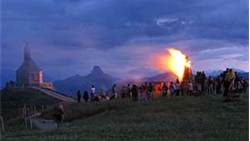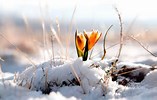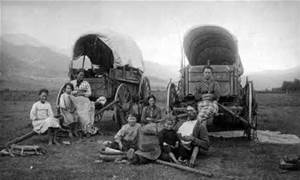
Summer Solstice
What do you mean the summer’s over? Why it just started didn’t it? I only got out of school last Wednesday. Summer vacations are still to come, days at the beach, barbecues. How could it possibly be over already?
It’s true, last Wednesday, June 23rd was the official start of summer in the United States (which is also the actual astronomical beginning of summer), but in several other countries, mainly in Northern Europe, the 23rd was a massively important holiday called Midsummer’s, a holiday that isn’t just one day, but a great glorious celebration that generally stretches over four or five.
In Sweden, Finland, Denmark, Norway, Latvia and Estonia, there are bonfires, festivals, parties, feasts, maypole dancing and a good deal of drinking as people celebrate the longest day of the year. For those of you who don’t know, in the summer time in these countries, depending how far you are to the north, the sun might not go down at all on Midsummer’s Night, or if it does, it doesn’t get dark. Instead, the land is bathed in a luxurious lavender light for a few short hours until the sun comes up again at something like three in the morning. It’s the time of year that, even more than Christmas, seizes the local imagination and has been immortalized in the painting, song and literature of all the Northern European countries for centuries, even millennium.
The holiday is actually a pre-Christian celebration of the summer solstice, of the light, in lands, where in the winter it gets very dark indeed. Lots of legends surround the Midsummer celebrations. In the past, bonfires were lit to fend off evil spirits who were said to be out and about on the night the sun turned south. Plants that bloomed on or around Midsummer’s were supposed to have special magical or healing properties. In any number of ways, future spouses were supposed to be revealed to young maidens and lads on this special night.
Today, people still light the bonfires, but aren’t as worried about the evil spirits. Any healing that may be taking place over Midsummer’s comes not from magical plants, but from the fact that in all of the above-mentioned countries, people take several days off to go out into the woods and fields and frolic with their families and friends. Future spouses may or may not be chosen, but it is a fact that in all of the Northern European countries an awful lot of people are born in March.
Yes, there can be no doubt about it. It is a magical time. Near endless light. The wild strawberries are ripe, the first new potatoes in, dill grows rampant in the gardens. At the Midsummer’s celebrations, there’s the dancing of curious dances (the Swedes have a song called Little Frogs where young and old hop around the midsummer pole together) and the singing of traditional songs. There is also quite a lot of over-eating and drinking and quite a few headaches the day after. In Finland, where the Midsummer celebrations often take place at lakeside, it’s a well-known fact that a certain number of people will drown on this night, jumping into the cold water to go swimming, but too inebriated to get themselves out again. (The death toll this year in Finland was 11. Last year, because the weather was bad, it was only 2.)
But back to what I said at the beginning. Why say that the summer is over on the 23rd ? Surely, even in Northern Europe, their great holiday proclaims them to be only in the middle of the season.
I say it is over because the sad fact is that though Midsummer’s marks the longest day of the year, it also marks the point at which the days begin to shorten again. Only a few weeks after Midsummer’s Day is over, you are painfully aware, in the northern countries, that the nights are already beginning to draw in.
In fact, for residents of the north, and for anyone who has lived or traveled there, there can only ever really be two seasons in the year: the season from the end of June to the end of December when the days grow ever darker and shorter, and the other, more preferable season, from December to June, when each day lengthens and lightens the land. It is this season, the season of hope, of anticipation and looking forward, that is the better one, and it ended, sad to say, last Wednesday, on Midsummer’s Day.





Hello, you used to write great, but the last few posts have been kinda boring… I miss your tremendous writings. Past few posts are just a bit out of track! come on!
I’ll try to do better!